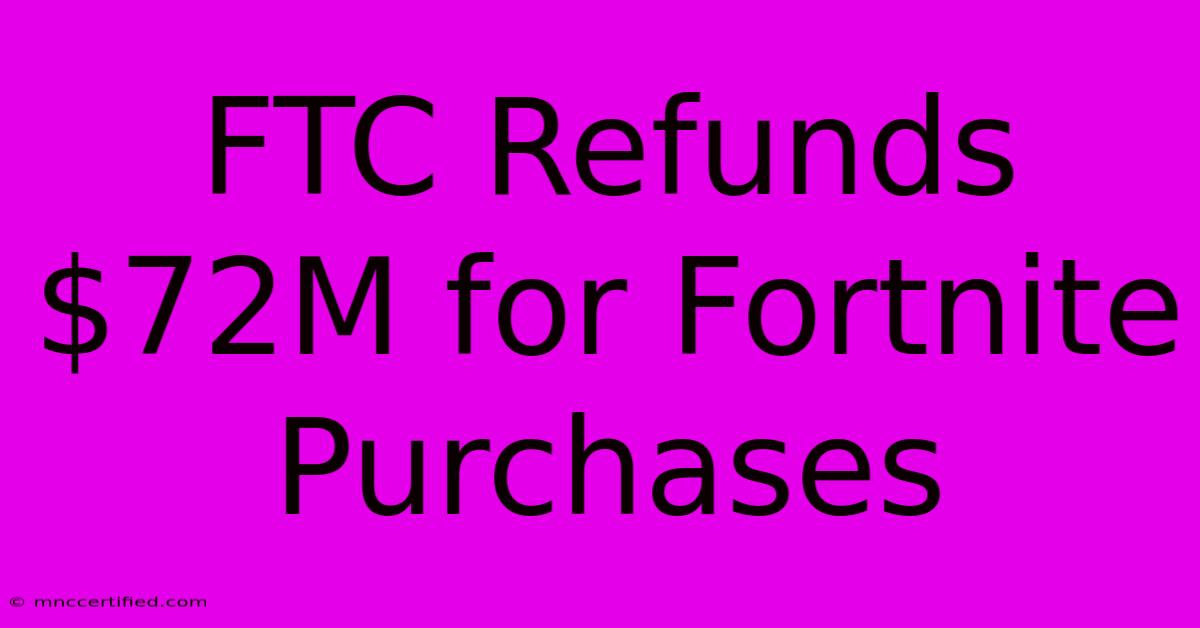FTC Refunds $72M For Fortnite Purchases

Table of Contents
FTC Refunds $72M for Fortnite Purchases: What You Need to Know
The Federal Trade Commission (FTC) recently announced a landmark settlement, refunding $72 million to consumers for unauthorized charges related to Epic Games' wildly popular game, Fortnite. This significant payout highlights the FTC's commitment to protecting consumers from unfair billing practices and underscores the importance of understanding in-app purchases. This article will delve into the details of the settlement, explain how it affects Fortnite players, and offer advice to prevent similar situations in the future.
Understanding the FTC's Action Against Epic Games
The FTC's complaint alleged that Epic Games employed "dark patterns"—deceptive design choices—to trick players, particularly children, into making unintended in-app purchases. These patterns involved easy-to-access purchase buttons, confusing interfaces, and the automatic charging of credit cards without sufficient parental consent. The FTC argued that these practices violated the Children's Online Privacy Protection Act (COPPA).
Key Findings of the FTC Investigation:
- Easy-to-access purchase buttons: Buttons were placed prominently, making accidental purchases more likely.
- Confusing interfaces: The design made it difficult for players to understand the costs associated with in-game items.
- Lack of parental consent: The system failed to adequately obtain parental consent for in-app purchases made by minors.
- Default settings: Automatic charging was enabled by default, further increasing the risk of unauthorized purchases.
Who is Eligible for a Refund?
The FTC's refund program covers players who were charged for unwanted Fortnite purchases between September 2017 and September 2021. This includes both direct purchases and unauthorized charges made by children without parental consent. The FTC's website provides a detailed explanation of eligibility criteria. It is crucial to check if you are eligible even if you are unsure about specific purchases.
How to Claim Your Refund
The refund process is managed by the FTC's third-party administrator. While specific details may vary, generally, you will need to provide information such as your email address associated with your Fortnite account, purchase dates, and the amount charged. The FTC's website will have the most up-to-date information and links to the claims process. Don't delay; deadlines for claims will exist.
Preventing Future Unauthorized Charges: Best Practices for Parents and Gamers
This situation highlights the need for increased parental oversight and player awareness regarding in-app purchases. Here are some crucial steps to prevent future unauthorized charges:
- Enable parental controls: Most gaming consoles and platforms offer parental controls that allow you to restrict spending and monitor in-app purchases. Actively use and regularly review these settings.
- Disable automatic billing: Ensure that automatic billing is turned off for all accounts associated with your gaming platform. Manually approve all purchases.
- Regularly review account statements: Check your credit card and bank statements regularly to identify any unauthorized charges promptly.
- Educate children about in-app purchases: Have open conversations with children about the costs associated with in-game items and the importance of seeking parental permission before making purchases.
- Use strong passwords: Protect your gaming account with a strong, unique password to prevent unauthorized access.
Conclusion: Learn from the Fortnite Refund
The FTC's $72 million refund for Fortnite purchases serves as a cautionary tale about the potential for deceptive in-app purchasing practices. By understanding the risks and taking proactive steps to protect yourself and your children, you can avoid falling victim to similar situations in the future. Remember to check your eligibility for a refund and act swiftly if you believe you were unfairly charged. The FTC's website is your best resource for up-to-date information and claiming your refund. Staying informed and taking preventative measures are key to responsible online gaming.

Thank you for visiting our website wich cover about FTC Refunds $72M For Fortnite Purchases. We hope the information provided has been useful to you. Feel free to contact us if you have any questions or need further assistance. See you next time and dont miss to bookmark.
Featured Posts
-
Alonso Linked To Nationals After Soto Deal
Dec 10, 2024
-
Assads Public Image Media Deception
Dec 10, 2024
-
Starmer In Cyprus Tuesday
Dec 10, 2024
-
Rogers Ready For Champions League Return
Dec 10, 2024
-
Trump Steps Down From Rnc Position
Dec 10, 2024